- Home
- Vladimir Nabokov
Laughter in the Dark Page 12
Laughter in the Dark Read online
Page 12
Albinus, as he tried to console her, unconsciously used the very words with which he had once comforted Irma when he kissed a bruise--words which now, after Irma's death, were vacant.
At first Margot vented her whole wrath upon him; then she abused Dorianna in terrible language; after which she assailed the producer. On the way she had a fling at Grossman, the old man with the stye, though he had had nothing at all to do with the matter.
"All right," said Albinus at last. "I'll do everything I possibly can for you. But I really don't think it was a failure. On the contrary, in several of the scenes you acted very well--in that first one, for instance, you know, when you--"
"Hold your tongue!" shrieked Margot, flinging an orange at him.
"But do listen to me, my pet. I'm prepared to do anything to make my darling happy. Now let's take a fresh handkerchief and dry up our tears for good. I'll tell you what I'll do. The film belongs to me. I've paid for the rubbish--I mean the rubbish Schwarz has made of it. I shall refuse to allow it to be shown anywhere, and I'll keep it as a souvenir for myself."
"No, burn it," sobbed Margot.
"Very well, I'll burn it. Dorianna won't be overpleased with that, I can assure you. Now--are we satisfied?"
She still went on sobbing, but more quietly.
"Come, come, don't cry any more, darling. Tomorrow you shall go and choose yourself something. Shall I tell you what? A big thing on four wheels. Have you forgotten that? Now, won't that be fun? Then you'll show it to me, and perhaps" (he smiled and raised his eyebrows, as he slyly drawled the word "perhaps") "I'll buy it. We'll drive miles and miles away. You shall see the spring in the South.... Eh, Margot?"
"That's not the point," she said sulkily.
"The point is that you should be happy. And happy you'll be. Where's that hanky? We'll come back in the autumn; you shall take some more courses in film-acting, and I'll find a really clever producer for you--Grossman, for instance."
"No, not him," muttered Margot with a shudder.
"All right, another one then. And now, wipe away your tears like a good girl, and we'll go out to supper. Please, little one."
"I'll never be happy until you get a divorce," she said, sighing deeply. "But I'm afraid you'll leave me, now that you've seen me in that disgusting film. Oh, another man in your place would have slapped their faces for making me look so monstrous! No, you shan't kiss me. Tell me, have you done anything about the divorce? Or has the whole thing been dropped?"
"Well, no ... You see, it's like this," stammered Albinus. "You ... We ... Oh, Margot, we have just ... That is to say, she in particular ... in a word, this bereavement makes it rather difficult for me."
"What's that you say?" asked Margot, rising to her feet. "Does she still not know that you want her to divorce you?"
"No, I didn't mean that," said Albinus lamely. "Of course, she feels ... That is to say, she knows ... Or, better say ..."
Margot slowly drew herself up higher and higher, like a snake when it uncoils.
"To tell the truth, she won't divorce me," said Albinus at last, for the first time in his life telling a lie about Elisabeth.
"Oh, is that so?" asked Margot, as she advanced on him.
"She's going to strike me," thought Albinus wearily.
Margot came right up to him and slowly placed her arms round his neck.
"I can't go on being only your mistress," she said, pressing her cheek against his tie, "I can't. Do something about it. Say to yourself tomorrow: I'll do it for my baby! There are lawyers. It can all be arranged."
"I promise you I'll do it this autumn," he said.
She sighed softly, walked to the mirror and languidly gazed at her own reflection.
"Divorce?" thought Albinus. "No, no, that's out of the question."
25
REX had converted the room which he had rented for his meetings with Margot into a studio, and whenever Margot came she found him at work. He generally whistled tunefully while he drew.
Margot gazed at his chalk-white cheeks, his thick, crimson lips pursed into a circle as he whistled, and she felt that this man meant everything to her. He wore a silk shirt with an open collar and a pair of old flannel trousers. He was performing miracles with Indian ink.
They met like this almost every afternoon, and Margot kept putting off the day of departure, although the car was bought and it was already spring.
"May I offer a suggestion?" said Rex to Albinus one day. "Why do you need to take a chauffeur for your trip? I'm rather good at driving cars, you know."
"That's very kind of you," answered Albinus, rather hesitatingly. "But ... well, I'm afraid to take you away from your work. We want to go rather a long way."
"Oh, don't bother about me. I meant to take a holiday in any case. Glorious sun ... quaint old customs ... golf-links ... trips included ..."
"In that case we shall be delighted," said Albinus, wondering anxiously what Margot would think of it. But Margot, after a little hesitation, agreed to the suggestion.
"All right, let him come," she said. "I really quite like him, but he's got into the habit of confiding his love-affairs to me, and he sighs over them as if they were the normal thing. It gets a little tedious."
It was the day before their departure. On her way home from the shops, Margot ran in to see Rex. The box of paints, the pencils, a dusty ray of sunlight slanting across the room--all this reminded her of the time when she posed in the nude.
"Why are you in such a hurry?" said Rex lazily, as she was making up her lips. "Today is the last time. I don't know how we're going to manage on the journey."
"We are both smart enough," she answered with a throaty laugh.
She ran into the street and looked for a taxi. But the sunlit thoroughfare was empty. She came to a square--and as she always did when she was returning home from Rex's room, she thought: "Shall I turn to the right, then across the garden, and then to the right again?"
There lay the street where she had lived as a child.
(The past was safe in its cage. Why not have a look?)
The street had not changed. There was the baker's at the corner, and there was the butcher's with the gilt ox-head on the signboard, and outside the shop a bulldog was tied up--it belonged to the major's widow from No. 15. But the stationery shop had turned into a hairdresser's. There was the same old newspaper woman at her stand. There was the beer-house which Otto used to patronize; and over there was the house in which she had been born: it was undergoing repairs, judging by the scaffolding. She did not care to go any nearer.
As she was walking back, a familiar voice called to her.
It was Kaspar, her brother's companion. He was pushing a bicycle with a violet frame and a basket in front of the handlebar.
"Hullo, Margot," he said, smiling a little shyly, and he walked along the pavement by her side.
The last time she had seen him he had been very surly; but that had been a group, an organization, almost a gang. Now that he was alone, he was simply an old friend.
"Well, how are you getting on, Margot?"
"Splendidly," she laughed. "And what about you?"
"Oh, just rubbing along. Did you know that your people have moved? They're living in North Berlin now. You should pay them a visit one day, Margot. Your father won't hold out much longer."
"And where's my dear brother?" she asked.
"Oh, he's gone away. I fancy he's working at Bielefeld."
"You know yourself how much they loved me at home," she said, frowning at her feet, as she walked on the very edge of the curb. "And did they bother about me afterward? Did they care what became of me?"
Kaspar coughed and said:
"All the same, they're your people, Margot. Your mother got the sack here and she doesn't like the new place."
"And what do people say about me here?" she asked, looking up at him.
"Oh, a lot of rubbish. Back-biting. The usual thing. I've always said that a girl has the right to do as she likes wit
h her own life. And are you getting on well with your friend?"
"Oh, yes, more or less. He's going to marry me soon."
"Fine," said Kaspar. "I'm very glad for your sake. Only it's a pity that it's impossible to have any fun with you, like in the old days. A great pity."
"Haven't you got a sweetheart?" she asked, smiling.
"No, not at the moment. Life's very hard sometimes, Margot. I'm working in a confectioner's. I should like to have a confectioner's shop of my own some day."
"Yes, life can be hard," said Margot pensively, and after a little pause she called a taxi.
"Perhaps one day we might--" Kaspar began; but no--they would never again bathe in that lake.
"She's going to the dogs," he thought as he watched her seat herself in the cab. "Ought to marry some good, simple man. I wouldn't take her, though. A fellow would never know where he was ..."
He swung himself onto the bicycle and rode rapidly after the taxi to the next street corner. Margot waved to him as he swerved gracefully into a side street.
26
ROADS bordered with apple trees, and then roads with plum trees, were lapped up by the front tires--endlessly. The weather was fine, and toward night the steel cells of the radiator were crammed with dead bees, and dragon-flies, and meadow-browns. Rex drove wonderfully, reclining lazily on the very low seat and manipulating the steering wheel with a tender and almost dreamy touch. In the back-window hung a plush monkey, gazing toward the North from which they were speeding away.
Then, in France, there were poplars along the roads; the maids in the hotels did not understand Margot, and this made her wild. It was proposed that they should spend the spring on the Riviera, and then push on to the Italian lakes. Shortly before reaching the coast, their last stopping place was at Rouginard.
They arrived there at sunset. An orange-flushed cloud curled in wisps across the pale green sky, above the dark mountains; lights glowed in the squatting cafes; the plane trees on the boulevard were already shrouded in darkness.
Margot was tired and irritable, as she always was toward night. Since their departure--that is to say, for almost three weeks (for they had not hurried, stopping in a number of picturesque little places with the same old church in the same old square), she had not once been alone with Rex. When they drove into Rouginard, and Albinus was going into ecstasies over the outlines of the purpling hills, Margot muttered through her clenched teeth: "Oh, gush away, gush away." She was on the brink of tears. They drove up to a big hotel, and Albinus went to ask about rooms.
"I shall go mad if this goes on much longer," said Margot, without looking at Rex.
"Give him a sleeping draught," suggested Rex. "I'll get one from the chemist."
"I've tried already," answered Margot, "but it doesn't act."
Albinus returned a little upset.
"No good," he said. "It's very tiresome. I'm sorry, darling."
They drove to three hotels in succession, and they were all full up. Margot flatly refused to go on to the next town, as she said that the curves of the road made her sick. She was in such a temper that Albinus was afraid to look at her. At last, in the fifth hotel, they were asked to enter the lift in order to go up and see the only two rooms available. An olive-skinned lift-boy who took them up stood with his handsome profile toward them.
"Look at those eyelashes," said Rex, nudging Albinus gently.
"Stop that damfoolery," exclaimed Margot suddenly.
The room with the double bed was not at all bad, but Margot kept tapping her heel gently on the floor and repeating in a low sulky voice: "I won't stay here, I won't stay here."
"But really, it's quite nice for one night," said Albinus entreatingly.
The servant opened an inside door to the bathroom; went through and opened a second door, disclosing a second bedroom.
Rex and Margot suddenly exchanged glances.
"I don't know if you'll mind sharing the bathroom with us, Rex?" said Albinus. "Margot is rather splashy and long about it."
"Good," laughed Rex. "We'll manage somehow."
"Are you quite sure you haven't got another single room?" asked Albinus, turning to the servant, but here Margot hurriedly intervened: "Nonsense," she said. "It's all right. I refuse to traipse around any longer."
She walked to the window while the baggage was being brought in. There was a big star in the plum-colored sky, the black tree-tops were perfectly still, crickets chirped ... but she saw and heard nothing.
Albinus began to unpack the toilet-things.
"I'm going to have a bath first," she said, undressing hurriedly.
"Go ahead," he answered cheerily. "I'll be shaving. But don't be too long--we must get some dinner."
In the mirror he saw Margot's jumper, skirt, a couple of light undergarments, one stocking and then the other, fly swiftly through the air.
"Little slattern," he said thickly, as he lathered his chin.
He heard the door shut, the bolts rattle and the water pour in noisily.
"You needn't lock yourself in, I'm not going to turn you out," he called out laughingly, as he stretched his cheek with his finger.
There was a loud and steady rush of water behind the locked door. Albinus carefully scraped his cheek with a heavily plated Gillette. He wondered whether they had lobsters a l'Americaine here.
The water went on rushing--and grew louder and louder. He had turned the corner, so to speak, and was about to return to his Adam's apple, where a few little bristles were always reluctant to go, when suddenly he noticed with a shock that a stream of water was trickling from beneath the door of the bathroom. The roar of the taps had now taken on a triumphant note.
"Surely she can't be drowned," he muttered, running to the door and knocking.
"Darling, are you all right? You're flooding the room!"
No answer.
"Margot, Margot!" he shouted, rattling the handle (and quite unconscious of the queer part doors played in his and her life).
Margot slipped back into the bathroom. It was full of steam and hot water. She swiftly turned off the taps.
"I went to sleep in the bath," she called out plaintively through the door.
"You're crazy," said Albinus. "How you frightened me!"
The rivulets blackening the pale gray carpet weakened and stopped. Albinus walked back to the mirror and lathered his throat once more.
In a few minutes Margot emerged fresh and radiant, and began to smother herself with talc-powder. Albinus, in his turn, went to have a bath. The place was reeking with moisture. He knocked at Rex's door.
"I won't keep you waiting," he cried. "The bath'll be free in a moment."
"Oh, take your time, take your time!" shouted Rex happily.
At supper Margot was in splendid spirits. They sat on the terrace. A white moth fluttered round the lamp and fell down on the tablecloth.
"We'll stay here a long, long time," said Margot. "I like this place tremendously."
27
A WEEK passed, and a second. The days were cloudless. There were lots of flowers and foreigners. An hour's drive took one to a beautiful sand beach set in dark red rocks against the dark blue sea. Pine-clad hills surrounded their hotel, a fine building as such buildings go, in a sickening Moorish style that would have made Albinus' flesh creep had he not been so happy. Margot was happy too; so was Rex.
She was much admired: by a silk manufacturer from Lyons; by a quiet Englishman who collected beetles; by the youths who played tennis with her. But no matter who stared at her or danced with her, Albinus felt no jealousy. It quite surprised him to recall the pangs he had suffered at Solfi: why had everything made him uneasy then and why did he feel so sure of her at present? He did not notice one little thing: that she no longer had any wish to please others; she needed only one man--Rex. And Rex was Albinus' shadow.
One day the three of them went for a long ramble in the mountains, got lost, and finally came down by a difficult stony path that took them the wrong way
. Margot, who was not used to walking, blistered her foot badly, and the two men carried her by turns, well-nigh crashing down with their burden, as neither was very robust. At about two in the afternoon they reached a sun-drenched little village, and found the Rouginard bus ready to start from a cobbly square where some men were playing bowls. Margot and Rex got inside, Albinus was about to do the same, but then, observing that the driver had not yet seated himself and would be some time yet helping an old farmer to get his two large crates in, he tapped on the half-open pane at which Margot was sitting and said he would make a dash for a drink. He made the dash and entered a small bar on the corner of the square. As he was reaching for his beer, he jostled against a delicate little man in white flannels who was hurriedly paying. They looked at each other.
"You here, Udo?" exclaimed Albinus. "This is an unexpected pleasure."
"Very unexpected," said Udo Conrad. "You've grown a little balder, old man. Are you here with your family?"
"Well, no ... You see, I'm staying at Rouginard and--"
"Good," said Conrad. "I'm living at Rouginard too. Heavens, the bus is starting. Hurry up."
"I'm coming," said Albinus, and swilled down his beer.
Conrad trotted toward the bus and boarded it. The horn tooted. Albinus fumbled with elusive French coins.
"Oh, there's no hurry," said the bartender, a melancholy man with a black drooping moustache. "It'll first go round the village and then stop again at this corner before going on."
"Ah, well," said Albinus. "Then I'll have another drink."
Through the bright doorway he saw the long, low, yellow bus speed away through a speckled maze of plane-tree shadow which seemed to mingle with it and dissolve it.
"Funny, meeting Udo," Albinus mused. "He's grown a little blond beard, as if to compensate for my loss of hair. When did we last see each other? Six years ago. Am I thrilled to see him? Not at all. I thought he lived in San Remo. A quaint, frail, rather eerie and not very happy man. Celibacy, hay-fever, hates cats and the ticking of clocks. A fine writer. A delightful writer. Funny that he hasn't the faintest idea that my life has changed. Funny, my standing here in this hot, drowsy little place where I've never been before and shall probably never come again. I wonder what Elisabeth is doing now? Black dress, idle hands. Better not think of it."

 Lolita
Lolita Laughter in the Dark
Laughter in the Dark Despair
Despair Mary
Mary The Enchanter
The Enchanter Pnin
Pnin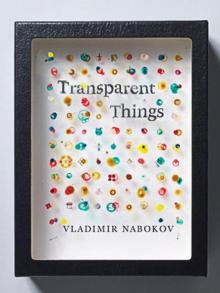 Transparent Things
Transparent Things The Real Life of Sebastian Knight
The Real Life of Sebastian Knight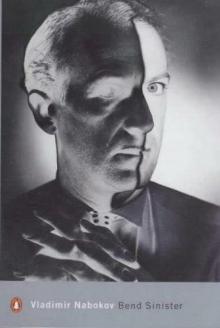 Bend Sinister
Bend Sinister Invitation to a Beheading
Invitation to a Beheading The Stories of Vladimir Nabokov
The Stories of Vladimir Nabokov The Eye
The Eye Letters to Véra
Letters to Véra Speak, Memory
Speak, Memory The Gift
The Gift The Luzhin Defense
The Luzhin Defense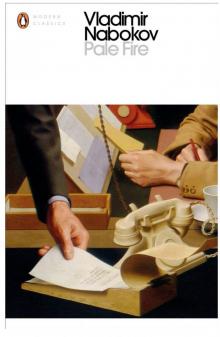 Pale Fire
Pale Fire Glory
Glory Man From the USSR & Other Plays
Man From the USSR & Other Plays Vladimir Nabokov: Selected Letters 1940-1977
Vladimir Nabokov: Selected Letters 1940-1977 Strong opinions
Strong opinions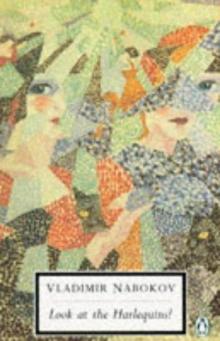 Look at the Harlequins!
Look at the Harlequins! The Tragedy of Mister Morn
The Tragedy of Mister Morn Ada, or Ardor
Ada, or Ardor Lectures on Russian literature
Lectures on Russian literature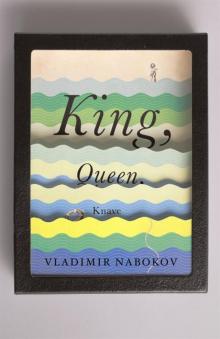 King, Queen, Knave
King, Queen, Knave The Original of Laura
The Original of Laura